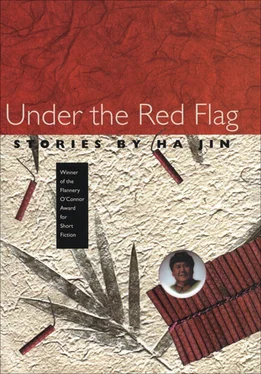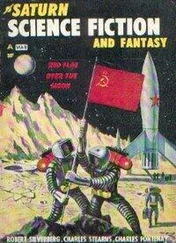One afternoon in the fall Niu Fen, Zhang Wei, and I went to Miao’s office to get some pamphlets for the class. On his door hung a sign, “No Admittance,” which had never been there before. We were uncertain if he was in, but we heard a noise inside. The three of us pressed our eyes on the cracks of the door to see what was going on. Both Miao and Wenli were standing by the window, but Wenli, her hips leaning against a desk, was unbuckling her belt.
“Just let me have a peek,” Miao said softly.
Outside we three looked at each other and stuck our tongues out. Then we heard Wenli say, “Just a peek, promise?”
“I promise.”
She pulled down her pants a little and revealed her white belly. “Lower, lower,” Miao urged.
The pants went down further, and a scar like a caterpillar, about three inches long, appeared close to her right groin. Miao touched the dark skin with his index finger, then bent down and kissed the scar. “Naughty, you’re a naughty boy,” Wenli said happily and pulled up her pants.
Bewildered by what we witnessed, the three of us turned around simultaneously and dashed to the head of the stairs as though escaping provoked hornets. Our footsteps must have startled them, for I heard Miao cry, “Oh heaven!”
Either Niu Fen or Zhang Wei told on them. Next morning we were summoned to the office of the school’s Revolutionary Committee. The leaders asked us to describe what we had seen and heard; without hesitation we told them all the details. We thought our teachers had done something bad and shameful, but we had no idea how serious it was. Director Liu said the two teachers were corrupt to the bones by bourgeois lifestyle.
In three days our school was covered with big-character posters exposing and condemning Miao Jian and Zhu Wenli. Many articles appeared on the walls and billboards, such as “Root Out the Bourgeois Lifestyle,” “It’s Shameless to Open Your Pants in the Office,” “Why Do You Still Behave like a Hoodlum?” “Zhu Wenli: the Stinking Bourgeois Miss,” “New China Does Not Tolerate the Incorrigible Progeny of Capitalists.” In the music class two days later, Wenli looked very pale, her eyes swollen and her voice a little hoarse. She tried to teach a song that expressed the Tibetans’ love for Chairman Mao, but we weren’t very interested. Quite a few students made faces at each other. Two boys even buckled and unbuckled their belts with meaningful noise.
Then Miao was sent to the country to be reformed through labor in the fields. Wenli was assigned to take over our class. She didn’t teach music anymore, because one of the school leaders had complained that she sounded as though wailing when singing a song which should be full of gusto, in accordance with the courageous spirit of the proletariat. Most students in our class were children of poor peasants, workers, and cadres, so it was not easy for Wenli to teach us. But unlike the boys, who often made insinuating remarks about her family background or imitated her voice, a number of girls were good to her, because they liked the way she danced and wanted her to teach them how to dance. Since I was clumsy, not cut out for dancing, I was never close to her. I noticed she seldom spoke to anyone outside class. A few wrinkles, very thin, appeared at the ends of her eyes. Her hair was no longer as tidy as before.
After the Spring Festival we began to study a new lesson in our Chinese class. The text was a letter Chairman Mao had written to the Albanian Communist Party. As usual, Wenli led us to read it out three times, and then she started to explain the new words and expressions. In the letter, there was a sentence that went like this: “You (the Albanian Communist Party) are a grand eagle soaring bravely; in comparison, the Russian Revisionists and the American Imperialists are merely a pile of yellowish dirt.”
Wenli said to the class, “Chairman Mao here uses a metaphor. Who knows what a metaphor is?”
We had never heard of that word, so nobody responded. Wenli wrote out the word on the blackboard and went on, “A metaphor is to compare one thing to something else. For example …” she coughed into her fist, “the Russian Revisionists and the American Imperialists are not dirt, but Chairman Mao describes them as dirt. That’s a metaphor.”
“I have a question, teacher,” Gao Jiang said and stood up. He was the tallest boy in the class.
“What’s your question?” Wenli asked with a start.
“You say the Russian Revisionists and the American Imperialists are not dirt, but Chairman Mao says clearly they are dirt. Why?”
Wenli’s lips were quivering, but she managed to say, “They aren’t dirt. They are also people like us. We call them dirt merely to show our contempt for them.”
“You mean they are also humans?” Niu Fen challenged.
“Ye-yes,” Wenli said.
The class was in a tumult now. Many of us were convinced that Wenli was wrong, not only wrong but reactionary. How dare she change Chairman Mao’s meaning! How could we trust such a teacher? Like her capitalist father, she must have hated our socialist country and our great Party all the time.
Wenli was so frightened she called off the class ten minutes before recess. Then some of us went straight to the Workers’ Propaganda Team, which consisted of five illiterate men from the Food Company, to report her. After hearing us, the vicedirector, Li Long, slapped his copy of Chairman Mao’s quotations on the desk and said, “Damn her grandmother, that bitch will never change. Now she’s done enough.”
The next day we had a new teacher. In a week Wenli was sent to the countryside. I don’t know to what village. At that time I didn’t care where she went; wherever she was sent, it seemed to me that she deserved it. Besides, there were so many people being reformed through labor that Wenli’s leaving was almost a natural thing.
The image of Wenli came to mind time and again, so I decided to visit her before I left, if she was still in Dismount Fort. Not because I wanted to apologize; I hadn’t done anything on purpose to hurt her. Though I didn’t know what to say to her exactly, my visit would at least assure her that a student of hers had not forgotten her after a decade.
One evening I asked Aunt and Uncle about her. “Wenli, you mean?” Aunt said with a big smile, her face full of creases and puckers. “She’s different now. She’s a strong woman in town. Everybody knows her.”
“Is she still a teacher in the elementary school?”
“No, she doesn’t teach anymore. You know, after the government canceled all the class-status stuff, she was back from the country and became a free person like us. Now she’s the vicepresident of the elementary school.”
“Is she married?”
“Of course. She has two kids, a boy and a girl, nice kids.”
“Who’s her husband? Miao Jian?”
“I don’t know. He’s also a cadre or something. My old man,” Aunt touched Uncle with her palm-leaf fan, “do you know who is Wenli’s husband? His name?”
“You bet I know. He’s Wang Dadong, the director of the People’s Bank in town.”
Uncle told me Miao Jian had left the country for Hong Kong seven years before. It was said that his granduncle was a rich, childless merchant, so Miao went there to inherit the wealth. Anyway, it seemed nothing had happened between him and Wenli. Aunt said Wenli’s family now lived in the granite house at the corner of East and Safe streets. I remembered that house well, where my classmate Dongdong had once lived.
The conversation with Aunt and Uncle made me more determined to see Wenli. The next afternoon I asked Aunt what gift 1 should take to Wenli if I paid her a visit.
“That’s easy, go buy two packets of walnut cookies,” she said.
Читать дальше












